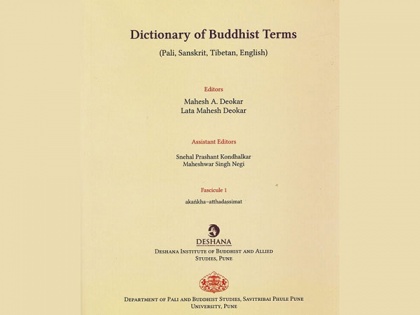Indian university introduces "Dictionary of Buddhist Terms" to promote Buddhist studies
By ANI | Published: July 1, 2023 03:39 PM2023-07-01T15:39:11+5:302023-07-01T15:40:20+5:30
Thimphu [Bhutan], July 1 : The Dictionary of Buddhist Terms has been published by the Department of Pali and ...

Indian university introduces "Dictionary of Buddhist Terms" to promote Buddhist studies
Thimphu [Bhutan], July 1 : The Dictionary of Buddhist Terms has been published by the Department of Pali and Buddhist Studies at Savitribai Phule Pune University (SPPU) in Pune, India, as a significant contribution to the academic community, reported The Bhutan Live.
This innovative multilingual dictionary uses Pali as the basis for its entries and offers translations into English, Sanskrit, and Tibetan. For academics interested in comparative Buddhist studies, each phrase is represented in Roman script and further supported by textual references.
The media revealed intentions for this ambitious dictionary to eventually build a vast 50-part collection with the introduction of the third portion on March 9. This lexicographic masterpiece's first two parts were published last year, according to The Bhutan Live.
The Bhutan Live covers Bhutan news, politics, Bhutan culture, Bhutanese Buddhism and more, for a unique understanding of the Himalayan region.
Plans for the future also call for Chinese translations, paving the way for this lexicon to be acclaimed as the only bilingual dictionary in its field.
Mahesh Deokar, the eminent professor who oversees the Department of Pali and Buddhist Studies, revealed upcoming plans to include the Chinese language. Deokar stated, "We are currently looking for a competent scholar to join our endeavour," and made further allusions to the dictionary perhaps being made available in Tibetan and Devanagari scripts.
The team behind this monumental project includes Prof Deokar, Lata Deokar, Snehal Kondhalkar, and Prof Maheshwar Singh Negi. They initiated this venture two years ago with the intention to eventually cover the full spectrum of the Pali alphabet in their dictionary, as per The Bhutan Live.
The dictionary currently has 100 words in each section, totalling 300 words that begin with the letter "A" in the first three sections. There will be at least 300 more words in the following section, according to the commitment.
As stated by SPPU, the aim of this book is to track the changing semantics of Buddhist terminology over space and time, illuminating both the common and unique vocabulary between Pali and Sanskrit Buddhist traditions.
In essence, the Dictionary of Buddhist Terms is intended to serve as a reference tool for academics conducting comparative analyses of various Buddhist practises, primarily employing Tibetan, Pali, and Sanskrit.
The vice-chancellor of SPPU, Prof Nitin Karmalkar, who has worked extensively in Ladakh and has interacted with Buddhist monks, thinks the dictionary can reveal Tibetan literary masterpieces that are currently hidden away in a number of Ladakh monasteries, according to The Bhutan Live.
Sanskrit expert and Vice-Chancellor of Deccan College Prof Prasad Joshi lauded the study for its significant contribution to lexicography. He has also spent years working on a Sanskrit dictionary. He emphasised the need for new lexicographers to be trained in order to save the craft from dying out and revealed a digital edition that would be available to academics all over the world.
The Khyentse Foundation and Deshana, an Institute of Buddhist and Allied Studies, oversaw the launch of this multilingual dictionary project in June 2020.
The Department of Pali and Buddhist Studies, earlier known as the Department of Pali, was found in July 2006. Before that, the Department of Sanskrit and Prakrit Languages offered courses in Pali and Buddhist studies. Currently, the Department is the only facility under SPPU's control where students can pursue various levels of study of Buddhist literature in Pali, Sanskrit, and Tibetan, The Bhutan Live reported.
Disclaimer: This post has been auto-published from an agency feed without any modifications to the text and has not been reviewed by an editor
Open in app